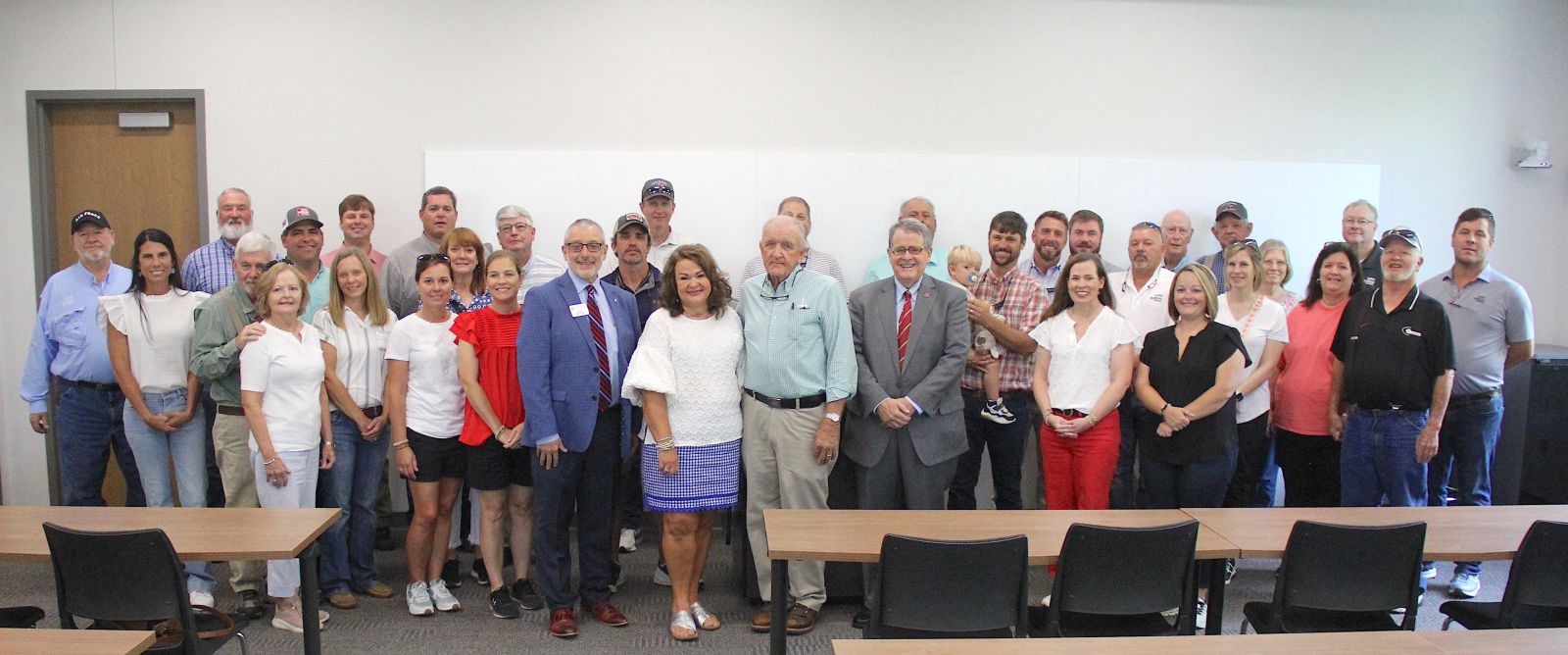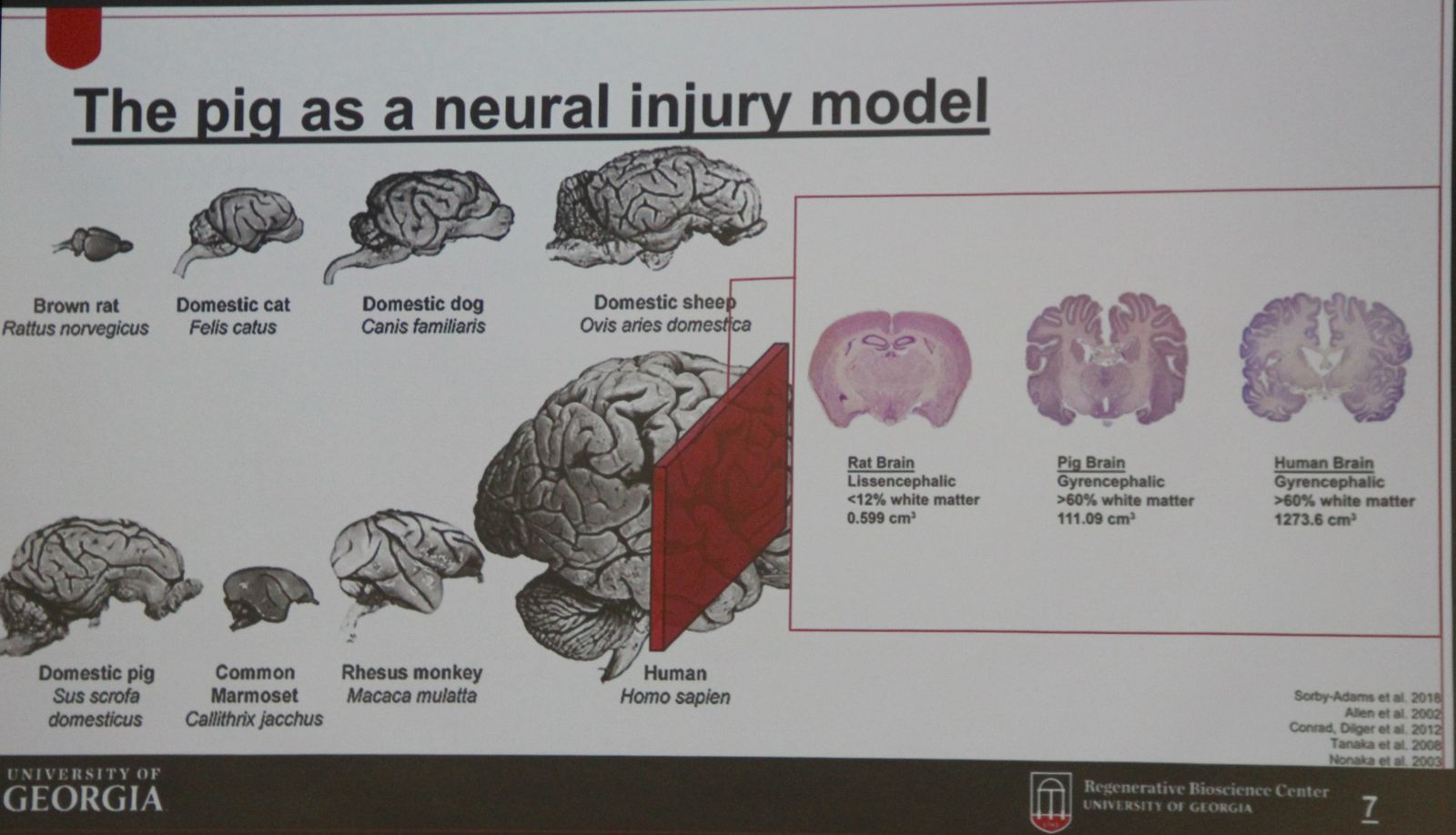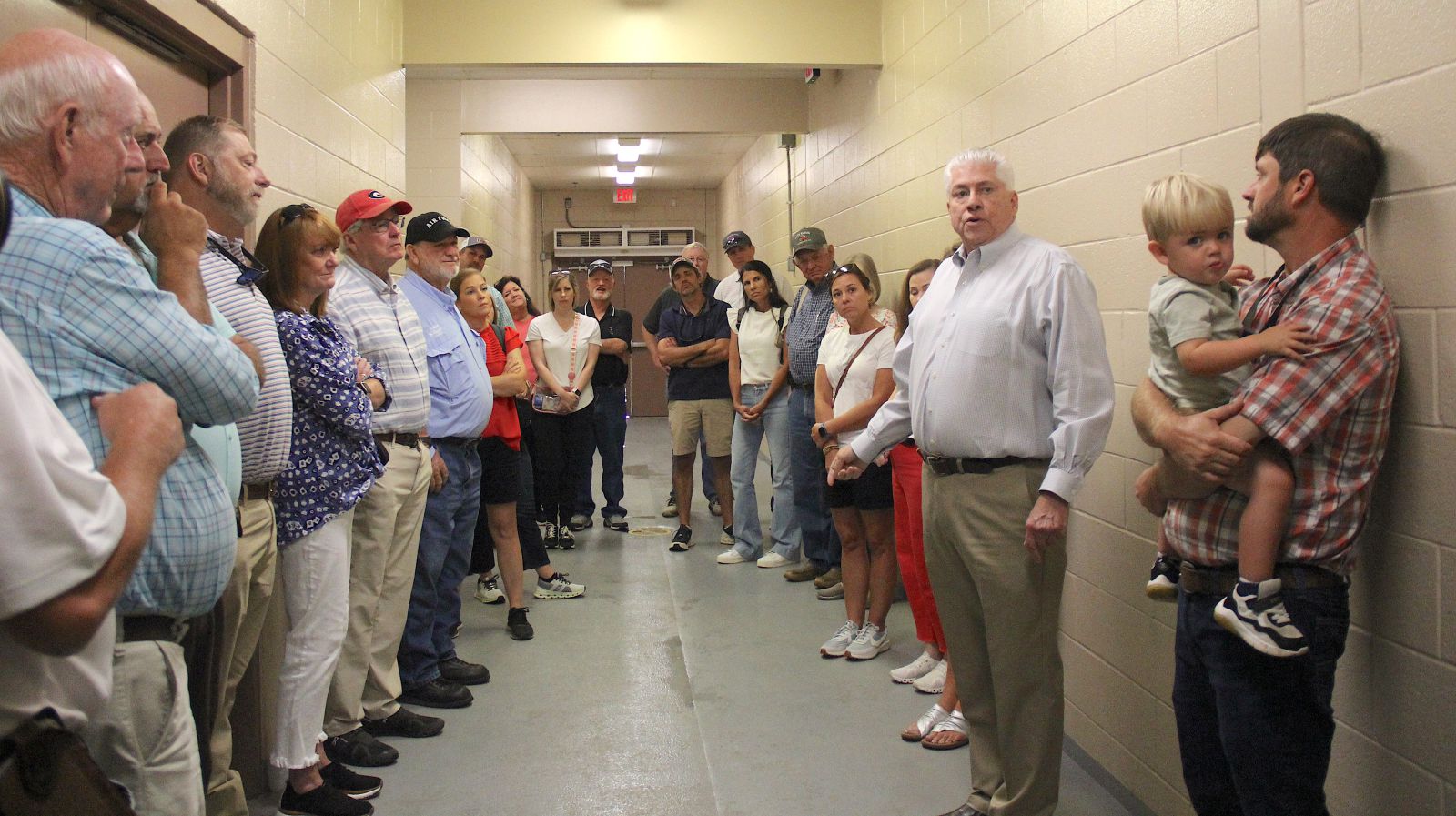Ag News
GFB visit to UGA Athens campus spotlights ag research
Posted on Aug 31, 2024 at 8:14 AM
By Jennifer Whittaker, Georgia Farm Bureau
Researchers at the UGA College of Agricultural & Environmental Sciences are studying pigs to reverse brain damage from strokes and other traumatic brain injuries, and their work is having real world applications. Members of the Georgia Farm Bureau Board of directors got to see these labs and the new CAES Poultry Science Building during a tour of the CAES Athens Campus on Aug. 22.
Many thanks to the UGA College of Agricultural & Environmental Sciences for welcoming the Georgia Farm Bureau Board of Directors & their spouses to the Athens campus Aug. 22 to tour the CAES Animal & Dairy Science Building & Meat Sciences labs. The group also had the chance to meet with UGA President Dr. Jere Morehead & CAES Dean Dr. Nick Place at the new CAES Poultry Science Building. / Photo by Jennifer Whittaker
CAES doing mind-blowing research to treat brain injuries
Slide courtesy of Dr. Erin Kaiser
Dr. Erin Kaiser, an assistant professor in Regenerative Bioscience Swine Research in the UGA CAES, explained the advantages of using a pig brain for research versus a rat.
“There’s a big difference between a rat and a human brain. A pig brain is only 7.5 times smaller than a human brain,” Kaiser said. “Dosing a pig is much closer to a human than a rat.”
Another similarity between human and pig brains, Kaiser said is that both have about 60% white brain tissue, where memories are storied versus gray. Rats have more gray tissue.
Kaiser is using pigs to research gender differences in stroke, traumatic brain injury, and vascular cognitive impairment pathophysiology. Her laboratory is using magnetic resonance imaging (MRI) to evaluate tissue-level changes as well as gait and neurobehavioral tests to evaluate functional-level outcomes in response to novel therapies such as neural stem cells, extracellular vesicles, nanoparticles, and other proprietary pharmaceuticals.
Kaiser and her research team collaborate with other research groups across the UGA campus including the UGA Colleges of Veterinary Medicine, Engineering, Public Health, Family & Consumer Sciences, Medicine, and Pharmacy. The team also works with public and private institutions like Georgia Technical Institute, Emory, and the Bill & Melinda Gates Foundation.
“We’re looking at using stem cells as neural injury therapy. We use skin cells to make the stem cells so it’s your cells going into your brain, so your body won’t reject them because they have your DNA,” Kaiser said.
Kaiser’s research is crucial because stroke is the leading cause of death in the U.S., and Southeast residents have a 34% higher risk of stroke than other regions of the country.
“After a hog has a stroke, they are figuring out how to make it well, so, hopefully the technology can be transferred to human medical technology,” GFB President Tom McCall said. “I get excited when I see all of this coming out of the College of Agriculture. When I was here in the 1970s, you learned how to grow animals better and how to butcher the animals. None of this was possible.”
This cutting-edge research is helping the UGA Animal & Dairy Sciences Department (ADSD) recruit pre-medicine students and educate them about agriculture before they’re taught misinformation.
“We have a lot of people who aren’t from an agriculture background in this major,” said Dr. Francis Fluharty, UGA ADSD head. “While we have them as undergrads, we have the ability to teach potential future doctors about red meat and its importance to human nutrition and how animals are properly raised.”
Staying true to its mission
UGA Animal & Dairy Sciences Dept. Head Dr. Francis Fluharty, second from right, discussed what his department is doing to prepare students to go into production agriculture and to help livestock & dairy producers on their farms. Dr. Fluharty also discussed steps his department is taking to recruit Georgia students to the department. / Photo by Jennifer Whittaker
Don’t worry that CAES has abandoned its mission to prepare tomorrow’s farmers and ranchers to raise livestock or harvest it efficiently.
“We haven’t lost sight of production agriculture. I still have cows myself,” Fluharty said. “From my standpoint, food production is national security.”
Fluharty discussed what his department is doing to prepare students to go into production agriculture and to help livestock and dairy producers on their farms.
A student-run/faculty-led Angus farm is being developed on campus that will give students credit for an Advanced Beef Production class.
Students interested in learning about dairy science can participate in the Jersey Active Management by Students (JAMS) program through which students make decisions about the mating, culling and sire selection at the UGA Teaching Dairy.
In addition to the UGA Beef teaching farm near Athens, the ADS department operates three other sizeable beef farms across Georgia where research is conducted to address production & forage issues Georgia cattle producers deal with. The ADS department also operates a teaching dairy, sheep, swine and horse farms near Athens where students get hands-on experience with raising livestock.
“Over forty percent of our undergrads participate in research projects during their time at UGA,” Fluharty said.
Student recruitment
CAES is also working to reverse the trend of Georgia FFA and 4-H members who show livestock opting to go out of state to school.
“I go to Perry and see smart kids showing livestock but they’re going out of state. Prior to this year we weren’t allowed to get names of people who applied but didn’t get in the first time. If you’re a really good kid in your county FFA or 4-H livestock program, I want your name,” Fluharty said. “We’ve got great things to offer students at UGA. We’ve got the only Regenerative Swine Science research major in the U.S. We had the 2022 National Meat Judging Team Champions.”
Fluharty mentioned the UGA CAES Rural Scholars Program that focuses on helping students from rural communities thrive at UGA, especially if they’re a first-generation student.
“Did you know that if you are the valedictorian or salutatorian of your school you have automatic admission to UGA?” Fluharty asked.
Fluharty stressed that he wants Georgia farmers and ranchers to know “We care and we’re trying to reach your kids to get them enrolled.”
CAES Poultry Sciences Building highlights state’s top commodity
The new UGA Poultry Sciences Building, which was dedicated Oct. 6, 2023, is a $54.1M facility that gives faculty, staff and students access to modern labs, collaborative meeting spaces and classrooms with the latest technology. Located just southwest of Ag Hill beside the science library and Family & Consumer Sciences College, the new building is fitting for Georgia’s top commodity.
Did you know that on an average day, Georgia produces 30.2 million pounds of chicken, 7.8 million table eggs and 6.5 million hatching eggs, per CAES stats? Last year, the average American consumed about 100.2 lbs. of poultry products.
Dr. Todd Applegate, CAES Poultry Science department head and R. Harold & Patsy Harrison Chair in Poultry Science, welcomed the GFB group to the new Poultry Sciences Building along with UGA President Dr. Jere Morehead.
Applegate said UGA has one of six poultry science departments in the Southeastern Conference with the others being at Texas A&M, University of Arkansas, Mississippi State, Auburn and non-SEC North Carolina State. UGA’s Poultry Science Department has the largest faculty and Extension staff of the six, he said. UGA’s Poultry Science department offers four undergrad majors: avian biology to prepare students for further degrees or employment related to birds; poultry science, with a dash of business that focuses on the expanding poultry industry and related industries; animal health, a pre-vet track that allows students to complete the minimum requirements for acceptance into UGA’s College of Veterinary Medicine in three years; and biological sciences, which prepares students for medical school, vet school or other graduate/professional degrees.
UGA President Morehead visits with GFB
“There are a lot of exciting things happening on this part of campus,” UGA President Morehead said. “Thank you for being here and your willingness to learn about the agriculture research we’re doing. I also thank you for your support of Dr. Nick Place, the dean of the College of Agricultural & Environmental Sciences. When we open the School of Medicine here in Athens, we’ll be one of only 11 universities in the U.S. that has a Vet Medicine College, College of Agriculture and Medicine together.”
Morehead announced that he has asked McCall to fill the seat on the UGA Research Foundation recently vacated by the death of Abit Massey.
“I think it’s really important that we have someone who understands agriculture serving on this foundation,” Morehead said. “When I first became UGA president, I went on a tour of farms around the state of which Tom was a part of and it soon became apparent to me that there’s no one in this state that doesn’t know Tom McCall.”
CAES Dean Dr. Nick Place stressed that research conducted in the new building will benefit Georgia’s poultry producers.
“We’re working to elevate our teaching research and Extension to be able to take the latest poultry research and technology developed here out to producers and to help them use it on their farms,” Place said. “I can’t wait to show you around this building that is serving the poultry sector that makes Georgia agriculture the top industry in our state.”
Dr. Manpreet Singh, UGA CAES Food Science & Technology Dept. head & professor, discussed food product development projects his department is working on including a UGA brand of ice cream.
- Categories:
- Tags:


